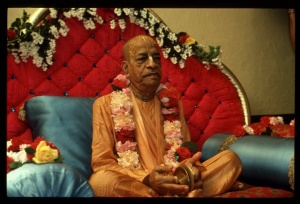CC Adi 10.105 (1975)

A.C. Bhaktivedanta Swami Prabhupada
Below is the 1996 edition text, ready to be substituted with the 1975 one using the compile form.
TEXT 105
- śrī-gopāla bhaṭṭa eka śākhā sarvottama
- rūpa-sanātana-saṅge yāṅra prema-ālāpana
SYNONYMS
śrī-gopāla bhaṭṭa—Śrī Gopāla Bhaṭṭa; eka—one; śākhā—branch; sarva-uttama—very exalted; rūpa—Rūpa; sanātana—Sanātana; saṅge—company; yāṅra—whose; prema—love of Godhead; ālāpana—discussion.
TRANSLATION
Śrī Gopāla Bhaṭṭa Gosvāmī, the forty-seventh branch, was one of the great and exalted branches of the tree. He always engaged in discourses about love of Godhead in the company of Rūpa Gosvāmī and Sanātana Gosvāmī.
PURPORT
Śrī Gopāla Bhaṭṭa Gosvāmī was the son of Veṅkaṭa Bhaṭṭa, a resident of Śrī Raṅgam. Gopāla Bhaṭṭa formerly belonged to the disciplic succession of the Rāmānuja-sampradāya but later became part of the Gauḍīya-sampradāya. In the year 1433 Śakābda (A.D. 1511), when Lord Caitanya Mahāprabhu was touring South India, He stayed for four months during the period of Cāturmāsya at the house of Veṅkaṭa Bhaṭṭa, who then got the opportunity to serve the Lord to his heart’s content. Gopāla Bhaṭṭa also got the opportunity to serve the Lord at this time. Śrī Gopāla Bhaṭṭa Gosvāmī was later initiated by his uncle, the great sannyāsī Prabodhānanda Sarasvatī. Both the father and the mother of Gopāla Bhaṭṭa Gosvāmī were extremely fortunate, for they dedicated their entire lives to the service of Lord Caitanya Mahāprabhu. They allowed Gopāla Bhaṭṭa Gosvāmī to go to Vṛndāvana, and they gave up their lives thinking of Śrī Caitanya Mahāprabhu. When Lord Caitanya was later informed that Gopāla Bhaṭṭa Gosvāmī had gone to Vṛndāvana and met Śrī Rūpa and Sanātana Gosvāmī, He was very pleased, and He advised Śrī Rūpa and Sanātana to accept Gopāla Bhaṭṭa Gosvāmī as their younger brother and take care of him. Śrī Sanātana Gosvāmī, out of his great affection for Gopāla Bhaṭṭa Gosvāmī, compiled the Vaiṣṇava smṛti named Hari-bhakti-vilāsa and published it under his name. Under the instruction of Śrīla Rūpa and Sanātana, Gopāla Bhaṭṭa Gosvāmī installed one of the seven principal Deities of Vṛndāvana, the Rādhāramaṇa Deity. The sevaits (priests) of the Rādhāramaṇa temple belong to the Gauḍīya-sampradāya.
When Kṛṣṇadāsa Kavirāja Gosvāmī took permission from all the Vaiṣṇavas before writing Śrī Caitanya-caritāmṛta, Gopāla Bhaṭṭa Gosvāmī also gave him his blessings, but he requested him not to mention his name in the book. Therefore Kṛṣṇadāsa Kavirāja Gosvāmī has mentioned Gopāla Bhaṭṭa Gosvāmī only very cautiously in one or two passages of the Caitanya-caritāmṛta. Śrīla Jīva Gosvāmī has written in the beginning of his Tattva-sandarbha, “A devotee from southern India who was born of a brāhmaṇa family and was a very intimate friend of Rūpa Gosvāmī and Sanātana Gosvāmī has written a book that he has not compiled chronologically. Therefore I, a tiny living entity known as jīva, am trying to assort the events of the book chronologically, consulting the direction of great personalities like Madhvācārya, Śrīdhara Svāmī, Rāmānujācārya and other senior Vaiṣṇavas in the disciplic succession.” In the beginning of the Bhagavat-sandarbha there are similar statements by Śrīla Jīva Gosvāmī. Śrīla Gopāla Bhaṭṭa Gosvāmī compiled a book called Sat-kriyā-sāra-dīpikā, edited the Hari-bhakti-vilāsa, wrote a foreword to the Ṣaṭ-sandarbha and a commentary on the Kṛṣṇa-karṇāmṛta, and installed the Rādhāramaṇa Deity in Vṛndāvana. In the Gaura-gaṇoddeśa-dīpikā (184) it is mentioned that his previous name in the pastimes of Lord Kṛṣṇa was Anaṅga-mañjarī. Sometimes he is also said to have been an incarnation of Guṇa-mañjarī. Śrīnivāsa Ācārya and Gopīnātha Pūjārī were two of his disciples.